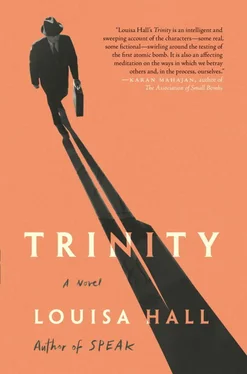Secretly, I looked down on the boys who ran over the lawns. Of course most people did, and there was nothing I could say without seeming unacceptably square. But I had my own established rituals. By then, I was a senior. I wasn’t so nervous about fitting in. I wasn’t so afraid my mother would show up and behave in some unpredictable manner.
I’d been at Sudbury four years, and she hadn’t done it so far, at least not in any way I couldn’t manage.
So I’d begun to feel safe. By then, I’d taken up squash, and that fall I’d been accepted to college, so I was starting to feel confident that things would work out.
And it wasn’t only my personal life that seemed to have been set in better order. The state of the world seemed more hopeful as well. Kennedy had averted the missile crisis in Cuba. He’d opened diplomatic channels with Khrushchev. It seemed possible that a larger-scale nuclear disarmament might be pursued.
You could have been forgiven, that spring, for thinking the nuclear threat had receded.
ON THE DAY THAT HE CAME TO SPEAK, I MUST HAVE BEEN SITTING INthe senior class transept. I was in the front pew. I remember that while we sang the opening hymn, he processed behind the chaplain and the headmaster.
He walked with his head down, carrying the hymnal, but I don’t think he was singing.
Our headmaster, Mr. Pritchard, introduced him. Mr. Pritchard had been a military historian at West Point before he came to Sudbury, so his opinion carried weight. When he walked up to the lectern, he carried himself with military correctness, and he stood very tall when he praised the unique contributions Dr. Oppenheimer had made to the war.
Even more than his military accomplishments, Mr. Pritchard said, it was his sense of restraint—the willingness to embrace limits—that placed him so squarely in that class of men we call great.
That’s what he said: “the willingness to embrace limits.” I remember it clearly. And I remember that, throughout the whole introduction, Dr. Oppenheimer sat with his head down. His long hands were clasped on his lap. He wore a suit with a vest, a style I liked, and he looked up only once, to survey us with an expression that was impossible to interpret.
Later, he rose and crossed the chancel. Then he climbed up to the lectern. His theme was the connection between power and privilege. He said—and I remember this well—that responsibility comes only with power.
I remember I wasn’t sure if I understood him correctly. Was he saying that we have no responsibility if we’ve been rendered powerless? That didn’t seem to me to be right, but he spoke with such quiet wisdom that I was sure I’d misinterpreted his theme.
He spoke so quietly and with so little bombast that even those of us in the front pew had to lean forward to hear him. At one point, he even trailed off into silence. He seemed to lose his train of thought. For a moment, he stared out the far door of the chapel, and in that moment my heart stopped.
At the eighth-grade graduation for the boarding school I’d managed to attend as a child, my mother showed up unannounced. She stormed in through the back door of the chapel, in the middle of the ceremony. The headmaster, who was delivering the graduation address, abruptly fell silent as she marched up to my pew and dragged me out down the aisle.
It would have been in protest against something having to do with Russian agents. But what I recall thinking, even as she pushed me out the same door she’d come in through, is that she’d clearly tried to look dignified for the occasion. She was wearing a white hat and white gloves, and carrying a nice purse, and she walked very straight, with her chin up. She ignored the fact that the students and even some of the teachers were nervously laughing, and whispering among one another.
Now it makes me sorry, to think of the effort she must have made to look dignified on my behalf. And how embarrassed I was, nonetheless, by everything about her behavior.
Later, in the car, on our way back to my grandmother’s house, I realized her gloves didn’t match. One was white, the other was cream, and for some reason, it was that fact that always made my face burn again when I remembered her dragging me out of the chapel.
BUT NOW I’M GETTING DISTRACTED. SHE DIDN’T COME TO THE CHAPELthat day. When he looked out the back door, he’d only lost his train of thought for a moment. Then he finished the talk, and it sounded so noble and wise that at the end, we stood and applauded.
The whole thing went off very well. Only afterward, when I’d headed to my next class, I realized I’d forgotten my blazer.
It was the only blazer I had, a hand-me-down from the financial aid office, so I had to run back to chapel to get it. I was annoyed at myself for my predictable vagueness. I could never seem to remember that blazer, and I hated nothing more than arriving late for my classes.
For a moment, on my way back, I stopped to wonder whether I should take the paths and run late, or cross over the lawn, and it was then that I happened to see him.
He was walking alone, heading away from me, moving toward the parking lot at the back of the chapel. Forgetting where I was and the dilemma I faced, I watched him go: the man who had created the atom bombs that were dropped on Hiroshima and Nagasaki; the inventor of the opening move of the Cold War, the move all the others had followed.
It seemed to me that someone should have accompanied him to his car. I thought he was the kind of man who should be followed by a whole cloud of admiring people, so it was strange to see him alone, moving through the shadows cast by the elm trees.
OF COURSE NOW IT’S DOUBLY STRANGE TO THINK HOW HOPEFUL Iwas as I watched him. The following fall, in my first semester of college, Kennedy was assassinated in Dallas. On the day he assumed office, Johnson made the commitment to escalate the war in Vietnam.
By the time I’d graduated from college, the draft was in place. Operation Rolling Thunder had nearly come to a close. We’d dropped more tons of explosives and incendiaries on Vietnam in three years than were dropped in the whole Korean War, and meanwhile, Johnson had modernized the nuclear arsenal and authorized dispersal of our nuclear weapons to countries abroad.
On a more personal note, moreover, my mother’s condition had deteriorated. I’d been made her legal guardian, which meant that it was my responsibility when she escaped from one of the halfway houses where I managed to place her. For weeks, after one of her many escapes, I’d live in a state of awful suspense until the police found her again, living somewhere on the streets, muttering about Soviet spies and Communist persecution.
You can imagine the relief I felt when, after graduating from college, I was offered the opportunity to return to Sudbury to teach. There, temporarily safe from the draft, earning enough money to place my mother in a private institution, I moved along the same walkways again, surrounded by the same fresh, healthful grass, and it seemed to me that the Sudbury campus was the one place on earth that had been untouched by all the recent political tumult.
Back on the campus of my alma mater, everything seemed to be in order. In June, for instance, as they always did, the tiger lilies around the chapel came into bloom. Walking by them, pausing for a moment to notice again the freckled throats of their flowers, I felt for the first time in several years that I knew where I was, and who I was in that instant.
It was just after I saw those lilies again, when I was moving away from the chapel, that I remembered Oppenheimer, walking alone, heading out from under the shade of the elms and off into the sunlight.
Читать дальше












